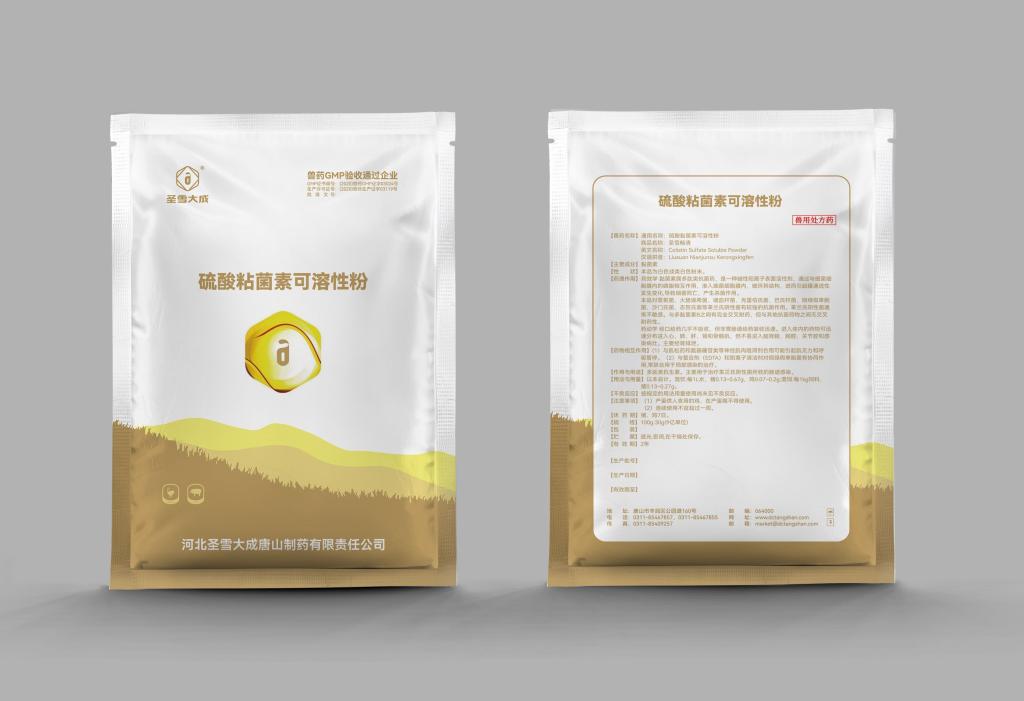Tel:+8618231198596

News
 CONTACT
CONTACT
 CONTACT
CONTACT
- Linkman:Linda Yao
- Tel: +8618231198596
- Email:linda.yao@dcpharma.cn
- Linkman:CHARLES.WANG
- Department:Overseas
- Tel: 0086 0311-85537378 0086 0311-85539701
News
Current Position:
Home >
News
>Colistin Sulfate Soluble Powder: Shaping Sustainable Practices in Animal Husbandry.
Colistin Sulfate Soluble Powder: Shaping Sustainable Practices in Animal Husbandry.
TIME:2024-01-23
I. Understanding Colistin Sulfate:
Colistin Sulfate is an antibiotic belonging to the polymyxin class, with Colistin being the active component. It is effective against Gram-negative bacteria and is commonly used in veterinary medicine to treat or prevent bacterial infections in livestock. Its solubility in water makes it suitable for administration in the form of a soluble powder, allowing for easy incorporation into animal feed or drinking water.
II. Applications in Animal Health:
One of the primary applications of Colistin Sulfate Soluble Powder in animal husbandry is the prevention and treatment of bacterial infections in livestock. Livestock, including poultry, swine, and cattle, are susceptible to various bacterial diseases that can compromise animal health and welfare. Colistin Sulfate's efficacy against Gram-negative bacteria makes it a valuable tool for controlling and managing these infections.
III. Responsible Use and Antibiotic Stewardship:
The rise of antibiotic resistance is a global concern, and the use of antibiotics in animal husbandry has been scrutinized for its potential contribution to this issue. Responsible use and antibiotic stewardship are crucial considerations in shaping sustainable practices in animal husbandry. This section explores measures such as prudent use guidelines, veterinary oversight, and alternatives to antibiotics, emphasizing the importance of ensuring the efficacy of Colistin Sulfate while minimizing the risk of resistance development.
IV. Alternatives and Complementary Approaches:
To promote sustainability in animal husbandry, it is essential to explore alternatives and complementary approaches to antibiotic use. This may include the development and adoption of vaccines, improved biosecurity measures, and probiotics to enhance gut health. The integration of these strategies alongside judicious Colistin Sulfate use can contribute to a holistic and sustainable approach to animal health management.
V. Disease Prevention and Biosecurity:
Preventing diseases in livestock is a key aspect of sustainable animal husbandry. Biosecurity measures, including quarantine protocols, proper sanitation, and controlled access to farms, play a pivotal role in preventing the introduction and spread of bacterial infections. Colistin Sulfate, when used judiciously as part of a comprehensive disease prevention program, can contribute to maintaining animal health and reducing the need for therapeutic interventions.
VI. Zoonotic Concerns and Public Health:
The potential transmission of antibiotic-resistant bacteria from animals to humans is a significant public health concern. This section examines the zoonotic aspects of Colistin Sulfate use in animal husbandry, addressing the importance of monitoring and mitigating the risk of transmission. Collaboration between the veterinary and public health sectors is crucial in implementing measures to safeguard human health while ensuring the well-being of animals.
VII. Environmental Impact and Resistance Genes:
The environmental impact of antibiotic use in animal husbandry extends beyond the farm. This section explores the potential for antibiotic residues and resistance genes to enter the environment through manure runoff and other pathways. Sustainable practices involve proper waste management, treatment of effluents, and efforts to minimize the environmental impact of Colistin Sulfate use in livestock production.
VIII. Research and Innovation:
Advancements in research and innovation are essential for shaping the future of sustainable animal husbandry. This section discusses ongoing research efforts to develop alternative therapies, optimize antibiotic formulations, and explore new technologies that can enhance animal health without compromising the environment or human health. Collaboration between researchers, veterinarians, and industry stakeholders is critical in driving innovation in the field.
IX. Regulatory Frameworks and International Collaboration:
The responsible use of Colistin Sulfate in animal husbandry is guided by regulatory frameworks and international standards. This section explores the current regulations surrounding Colistin Sulfate use, including permissible concentrations, withdrawal periods, and reporting requirements. International collaboration and adherence to guidelines contribute to global efforts in promoting sustainable practices and mitigating the risks associated with antibiotic use in livestock.
X. Farm Animal Welfare Considerations:
Farm animal welfare is a fundamental aspect of sustainable animal husbandry. This section discusses the impact of disease on animal welfare and the role of Colistin Sulfate in alleviating suffering when infections occur. Balancing the need for treatment with a commitment to animal welfare requires a holistic approach that considers both the health and well-being of animals.
XI. Consumer Awareness and Ethical Consumption:
Consumer awareness and ethical consumption are influential factors in shaping sustainable practices in animal husbandry. This section explores the role of transparent labeling, certification programs, and consumer education in promoting responsible antibiotic use in livestock production. Ethical considerations surrounding the treatment of animals and the responsible use of Colistin Sulfate contribute to informed consumer choices.
XII. Conclusion:
In conclusion, Colistin Sulfate Soluble Powder plays a multifaceted role in shaping sustainable practices in animal husbandry. Its effectiveness in treating bacterial infections, when used responsibly and judiciously, can contribute to animal health and welfare. However, the challenges of antibiotic resistance, environmental impact, and public health necessitate a comprehensive and collaborative approach. By embracing alternatives, implementing rigorous biosecurity measures, and fostering research and innovation, the animal husbandry industry can move towards a more sustainable future where Colistin Sulfate is part of a holistic strategy for ensuring both animal and human well-being.
- Tel:+8618231198596
- Whatsapp:18231198596
- Chat With Skype







